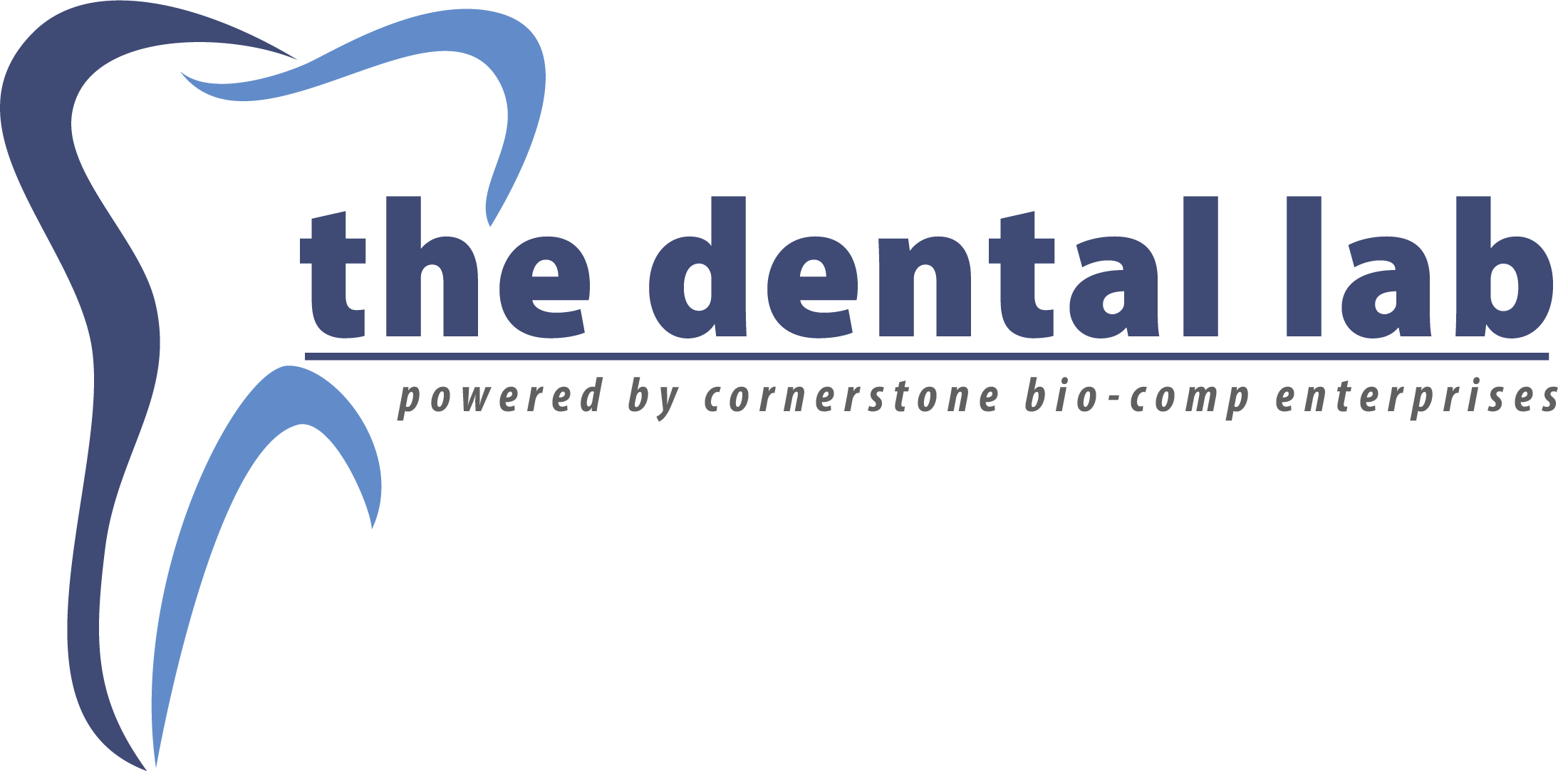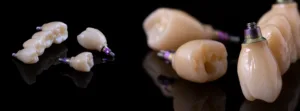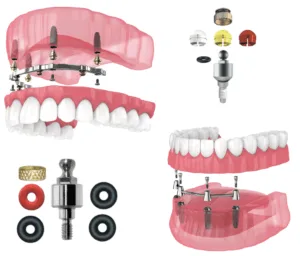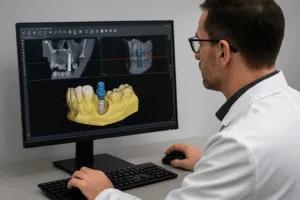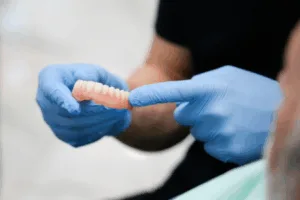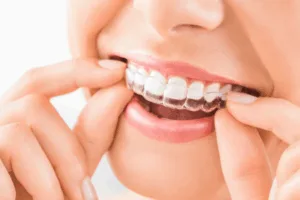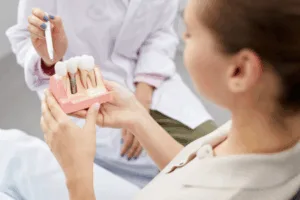Analog vs. Digital Denture Fabrication
All over the world, edentulism is considered an impairment to the patient’s quality of life and nutrition. Fortunately, patients have the option to restore their smiles with dentures, and have even further options when it comes to fabrication processes. Analog and digital dental dentures vary drastically when it comes to manufacturing, which ultimately impacts turnaround times, prostheses fittings, and patient satisfaction.
Patients with missing teeth have the option to receive the latest in technology through digitally designed dentures or stick to traditional methods. With an analog workflow, dentures are hand-crafted to perfection. On the other hand, with the help of computer-aided design, technicians can have assistance with the beginning stages of the design process and then are able to use their creative artistry.
What is a Dental Denture?
Dentures are custom-made removable prosthetics designed to restore aesthetics and function in edentulous patients. They serve as a replacement for missing teeth and the surrounding tissues. There are two types of dentures: complete and partials. Complete dentures are used for fully edentulous patients–or when all the teeth are missing from an arch. On the other hand, partial dentures are used when there are some remaining natural teeth left in the arch.
Complete full mouth dentures can be either fixed through implant-supported dentures and cement-retained dentures, or they can be fully removable. There are different types of implant-retained dentures, such as hybrid dentures, and locator overdentures. Partials can be broken down into further categories, including dental nesbits, dental flippers, and cast metal frameworks.
Traditional Denture Fabrication
Despite many advances in medical technology, analog denture production still remains as the most common method for dentists to deliver dentures. The hand-crafted dentures are made of a flesh-colored acrylic base that fits securely over the gums and restorative teeth.
They require a series of complex clinical and laboratory procedures to achieve an accurate and comfortable fit. Multiple appointments are needed for molds, extractions, fittings, and adjustments.
Typical Analog Denture Procedure:
- The dentist takes preliminary and final denture impressions of the alveolar ridges and the maxillo-mandibular relation is recorded and sent to the lab.
- Based on the impressions, a definitive stone cast is created.
- The laboratory technician creates the wax occlusion rim.
- The models are then mounted on a semi-adjustable articulator with a face-bow.
- The technician adds teeth to the wax base for the try-in appointment.
- The wax denture is evaluated by the dentist and patient for fit and aesthetics.
- Upon acceptance or adjustments, permanent dentures are made by the lab.
- The final prosthesis is placed by the clinician.
A common drawback of analog dentures is that multiple adjustments are needed, which also means multiple try-in sessions are needed with the patient. Additionally, if the denture breaks or is misplaced, the entire process needs to be repeated–starting with impressions. However, analog dentures can also be fabricated from digital scans via intraoral scanners. Digital scans are stored on file indefinitely, so the dentist can skip this step if a remake is needed.
Digital Denture Process
Digital Denture fabrication has enabled a shortened workflow for the lab and dentist, while increasing patient comfort. 3D-printed dentures can be fabricated from start to finish, meaning there are no try-ins during the manufacturing process at all. However, a wax or 3D-printed prototype can be tried-in if desired. After milling or 3D printing, the restoration is sent directly to the dentist. Typically, very few adjustments–if any–are needed. Digital dentures are reported to have a precise base fit, higher retention, and better suction, drastically reducing the number of fitting appointments.
Digital complete dentures that cover the full arch are created through 3D-printing denture technology. On the other hand, partial dentures can be digitally milled with CAD/CAM-powered milling machines.
Typical Digital Denture Procedure:
- The dentist takes impressions either through conventional methods with impergum alginate or via intraoral digital scanner.
- Conventional impressions of the edentulous jaws and bite registrations are scanned by the lab, while scans taken with intraoral scanners are already imported into the CAD/CAM system via digital portal. Through computer-aided design (CAD), the scans are digitized with obtained data for virtual tooth arrangement and denture base design.
- A technician designs the prostheses virtually.
- Computer-aided manufacturing (CAM) can create acrylic resin dentures through digital additive printing or subtractive milling. Printing is done with 3D printers that layer resin to create the desired shape, while milling consists of carving out a solid block of cured, hard resin that doesn’t distort over time.
- Lastly, the restorative teeth are added and the 3D-printed denture is finished before being sent to the dentist and patient for fittings.
Clinically, digitally fabricated dentures have shown promising performance, due to the resin’s impressive fracture toughness. According to Jimmy Stegall of Dentsply Sirona, digital denture resin is about 2-3 times stronger in terms of fracture toughness when compared to conventional acrylics. The material has a higher survival rate and can withstand more pressure than traditional acrylic. Patients also benefit greatly from the digital workflow as turnaround time is significantly reduced and the fit is more accurate and comfortable. Moreover, the digital record helps to facilitate any reproduction needed as it is indefinitely stored in a digital file. Remakes can be done at a click of a button.
Denture Labs Near Me
The Dental Lab is a premium dental lab for dentures that makes both traditional analog dentures and digital dentures. If you’re looking for a denture laboratory near me, look no further because we service all states throughout the nation. We are among the leading denture labs in America that provides both handcrafted analog dentures and 3D virtual printed digital dentures. If you have any questions or would like to learn more about our products, please do not hesitate to contact us for dental and denture services. Our technicians are always available and willing to speak.
Keywords:
Dental lab for dentures, Denture labs near me, denture impressions, denture lab, denture lab near me, digital denture, dental nesbit, Analog Dentures, Dentures, 3D printing dentures, Digital Dentures, Digital Dentistry, Denture laboratory near me, Digital Dental Lab, complete dentures, dental lab near me, denture labs, dental and denture services, dental and dentures, 3d printed dentures, dental denture, dental dentures, dental flipper, implant-supported dentures, cement-retained dentures, denture procedure, denture process, implant retained dentures, hybrid dentures, locator overdenture, full denture, full mouth denture, digital denture
